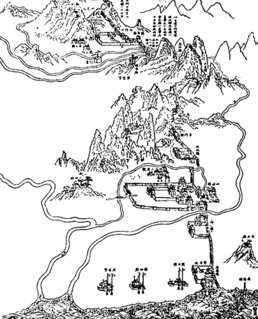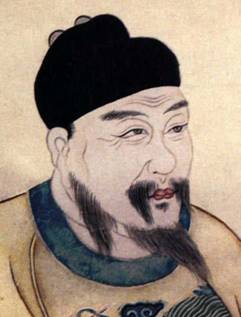 W
WThe Southern Ming, officially the Great Ming, was a series of dynastic rump states ruled by the Zhu clan in southern China following the Ming dynasty's collapse in 1644. The Ming dynasty ended when Shun forces led by Li Zicheng captured Beijing and the last Ming emperor Chongzhen committed suicide. The Ming general Wu Sangui then opened the gates of the Shanhai Pass in the eastern section of the Great Wall to the multi-ethnic Qing banners, in hope of using them to annihilate the Shun forces. Ming loyalists fled to Nanjing, where they enthroned Zhu Yousong as the Hongguang Emperor, marking the start of the Southern Ming. The Nanjing regime lasted until 1645, when Qing forces captured Nanjing, and by then Zhu had been executed. Later figures continued to hold court in various southern Chinese cities, although the Qing considered them to be pretenders.
 W
WThe Southern Ming, officially the Great Ming, was a series of dynastic rump states ruled by the Zhu clan in southern China following the Ming dynasty's collapse in 1644. The Ming dynasty ended when Shun forces led by Li Zicheng captured Beijing and the last Ming emperor Chongzhen committed suicide. The Ming general Wu Sangui then opened the gates of the Shanhai Pass in the eastern section of the Great Wall to the multi-ethnic Qing banners, in hope of using them to annihilate the Shun forces. Ming loyalists fled to Nanjing, where they enthroned Zhu Yousong as the Hongguang Emperor, marking the start of the Southern Ming. The Nanjing regime lasted until 1645, when Qing forces captured Nanjing, and by then Zhu had been executed. Later figures continued to hold court in various southern Chinese cities, although the Qing considered them to be pretenders.
 W
WEmpress Dowager Ma (1578–1669), personal name unknown, formally known as Empress Dowager Zhaosheng (昭聖太后), was an empress dowager of the Southern Ming Dynasty. She was the birth mother of the Yongli Emperor. She converted to Roman Catholicism and adopted the name Maria.
 W
WEmpress Dowager Wang, personal name unknown, formally known as Empress Dowager Xiaozheng (孝正太后), was an empress dowager of the Southern Ming Dynasty. She was the main consort of Zhu Changying, Prince of Gui, the father of the Yongli Emperor. She converted to Roman Catholicism and adopted the name Helena.
 W
WThe Kingdom of Tungning, also known as Tywan by the British at the time, was a dynastic maritime state that ruled part of southwestern Formosa (Taiwan) and Penghu islands between 1661 and 1683, which was regarded as the first predominantly Han Chinese state in Taiwanese history. At its peak the kingdom's maritime power dominated varying extents of coastal regions of southeastern China, and its vast trade network stretching from Japan to Southeast Asia.
 W
WThe Peach Blossom Fan is a musical play and historical drama in 44 scenes that was completed in 1699 by the early Qing dynasty playwright Kong Shangren after more than 10 years of effort.
 W
WThe transition from Ming to Qing, Ming–Qing transition, or Manchu conquest of China from 1618 to 1683 saw the transition between two major dynasties in Chinese history. It was the decades-long conflict between the emergent Qing dynasty (清朝), the incumbent Ming dynasty (明朝), and several smaller factions in China. It ended with the rise of the Qing, and the fall of the Ming and other factions.
 W
WEmpress Xiaogangkuang was a Chinese Empress consort of the Southern Ming Dynasty, empress to the Yongli Emperor. She converted to Roman Catholicism and adopted the name Anne.
 W
WZhu Shugui, courtesy name Tianqiu and art name Yiyuanzi, formally known as the Prince of Ningjing, was a Ming dynasty prince and the last of the pretenders to the Ming throne after the fall of the Ming Empire in 1644. He committed suicide when forces of the Manchu-led Qing dynasty conquered the Southern Ming dynasty's Kingdom of Tungning in Taiwan, where he took shelter after mainland China fell under Qing control. He was a ninth-generation descendant of Zhu Yuanzhang, the founder of the Ming dynasty, via the line of Zhu Yuanzhang's 15th son, Zhu Zhi 朱植. Zhu Zhi was the son of Zhu Yuanzhang and one of his Korean concubines, a female consort surnamed Han from Goryeo in Korea. Zhu Zhi's heirs used the generation names "Gui, Hao, En, Chong, Zhi, Yun, Reng, Qi, Bao, He, Xian, Shu, Yan, Zun, Ru, Cai, Han, Li, Long, Yu".
 W
WZhu Yujian, originally the Prince of Tang, later reigned as the Longwu Emperor of the Southern Ming dynasty from 18 August 1645, when he was enthroned in Fuzhou, to 6 October 1646, when he was captured and executed by a contingent of the Qing army. He was an eighth generation descendant of Zhu Jing, Prince Ding of Tang, who was the 23rd son of Ming founder Zhu Yuanzhang.